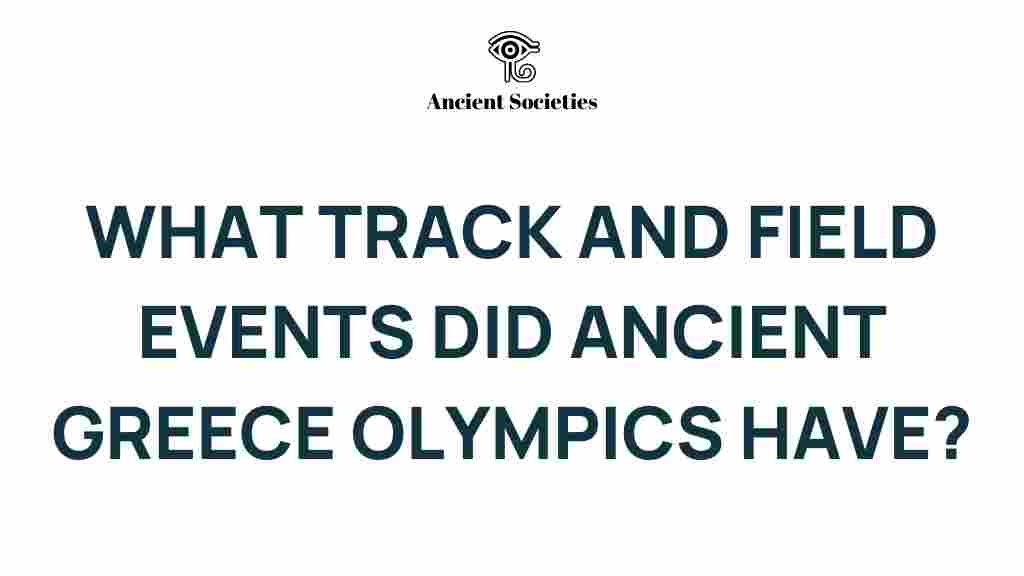Unraveling the Track and Field Events of Ancient Greek Olympics
The ancient Olympics, a cornerstone of Western sports culture, were held in Olympia, Greece, and celebrated not only athletic prowess but also a rich tapestry of cultural significance. These events laid the groundwork for modern track and field competitions, showcasing the spirit of competition and the dedication of athletes. As we delve into the history of the ancient Greece Olympics, we will explore the various athletic events, their evolution, and their lasting impact on sports.
The Origins of the Ancient Greek Olympics
The ancient Greek Olympics began in 776 BC and were held every four years, drawing competitors from various city-states. These games honored Zeus and were a way to unite the Greeks in a time of political fragmentation. The Olympics were more than just a sporting event; they were a celebration of heritage, showcasing the cultural values of strength, honor, and glory.
Key Track and Field Events in Ancient Greece
The core of the ancient Olympics was the track and field events, which included a variety of competitions that tested speed, strength, and endurance. Here’s a closer look at some of the primary events:
- Stadion: This was a short sprint of approximately 192 meters, which was the earliest and most prestigious event. The winner earned a crown of olive leaves.
- Diaulos: A double-stadion race, roughly 384 meters long, it involved running down the track and back.
- Dolichos: This long-distance race varied in length, typically ranging from 7 to 24 laps around the stadium, testing the endurance of the athletes.
- Hoplitodromos: A race where competitors wore armor, including a shield and helmet, which emphasized both speed and strength.
- Long Jump: Athletes used weights called halteres to help propel themselves further during their jumps.
- Discus Throw: Competitors hurled a heavy disc, and distance was measured to determine the winner.
- Javelin Throw: Similar to the discus, this event required skill and precision in throwing a spear-like object.
The Cultural Significance of Track and Field Events
The ancient Greece Olympics were steeped in cultural significance. The games served as a means of showcasing the virtues of the Greek way of life, including:
- Unity: The Olympics brought together different city-states, fostering a sense of shared identity among the Greeks.
- Honor: Victors were celebrated and often received rewards and privileges upon returning home, elevating their status within their communities.
- Religious Observance: The games were held in honor of Zeus, with rituals and sacrifices performed to gain favor from the gods.
- Artistic Expression: Victors were often immortalized in sculptures and poetry, merging athletics with the arts.
Evolution of Athletic Events
Initially, the ancient Olympics featured only a few events. However, as the games progressed, the diversity of athletic events expanded significantly. By the 5th century BC, more events were introduced, including:
- Pankration: A combination of wrestling and boxing, this event was known for its brutality and minimal rules.
- Wrestling: A popular sport that tested strength and technique, with various styles represented.
- Chariot Racing: Although not a track and field event per se, it was immensely popular, involving teams of horses and chariots.
Preparing for the Olympic Games
For athletes of ancient Greece, preparing for the Olympics was a rigorous process. Here’s how they typically prepared:
- Training Regimen: Athletes trained for years, often in specialized facilities called gymnasiums.
- Diet: A strict diet was crucial; athletes consumed a high-protein diet to build strength.
- Mental Preparation: Visualization and mental toughness were emphasized, as much of the competition was psychological.
- Coaching: Many athletes worked with experienced coaches who provided guidance and strategy.
Common Challenges Faced by Athletes
While preparing for the Olympics, athletes faced numerous challenges:
- Physical Injuries: The rigors of training often led to injuries, which could hinder performance.
- Competition Stress: The pressure to perform could lead to anxiety and affect an athlete’s focus.
- Resource Limitations: Not all athletes had access to training facilities or coaching.
Legacy and Impact on Modern Sports
The influence of the ancient Greece Olympics extends beyond their time, significantly impacting modern sports. The revival of the Olympics in the 19th century drew inspiration from these ancient traditions. Today, track and field events are among the most celebrated in the modern Olympic Games.
Moreover, the values of competition, excellence, and sportsmanship that were emphasized in ancient times continue to resonate in contemporary sports culture. The Olympic motto, “Citius, Altius, Fortius” (Faster, Higher, Stronger), encapsulates the spirit first ignited in the ancient stadiums of Greece.
Conclusion
The ancient Greece Olympics, particularly the track and field events, were a monumental chapter in the history of sports. They not only celebrated athletic excellence but also reinforced the cultural, social, and religious fabric of Greek society. As we reflect on these ancient traditions, we see the profound ways they have shaped modern athletics and the enduring legacy of competition.
For those interested in learning more about the rich history of the Olympics, you can check out this comprehensive resource on the Olympic Games. To explore further insights into ancient sports and cultural heritage, visit this page.
This article is in the category History and created by AncientSocieties Team
